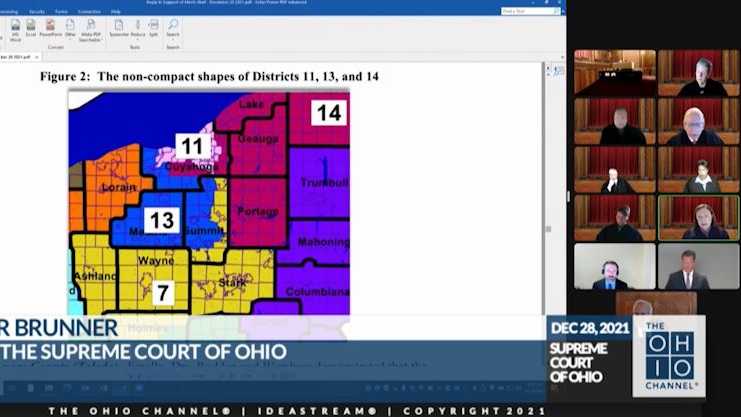

Who will represent you in the U.S. Congress is now being decided, in part, by Ohio's Supreme Court.The justices heard arguments Tuesday over Ohio's recently approved Congressional districts.Hamilton County is at the center of this debate and whether it being split into three voting districts is constitutional.Democrats argue splitting up Hamilton County into three slices illegally dices up votes from the black population.Republicans say it had to be done because of population rules for Congressional districts.Now, the Ohio Supreme Court will decide if the map drawn by Republicans is gerrymandering. "Hamilton County, of course, a chunk of it is carved out and attached to Warren County. It's notable because under the constitution a provision was passed that Cincinnati would be kept whole," said attorney Robert D. Fram.Hamilton County's population is just over what a district can hold."Hamilton County was split the way it was because there was an attempt to join it with a whole county. There's a provision in article 19 that specifies where you can, every district should have a whole county," said attorney Phillip J. Strach who is representing Republican legislative leaders.Democrats argue the GOP intentionally broke up largely-democratic Cincinnati and piece it out with a Republican stronghold like Warren County."Non-compact districts were created for the goal of partisan gain," Fram said."Minorities in Hamilton County have been afforded all the rights under federal law to which they are entitled in the drawing of these districts," Strach said.Strach said this map creates more competitive districts and 7 district could go either way come election time.Opponents argue that's not the case."If Ohio State every year has to spot Michigan a two touchdown lead, it might make the game more competitive, the rules are set up to favor one team over the other and that's exactly what they've done here with their supposedly competitive districts," said attorney Ben Stafford.No decision from the court at this time.Justices will eventually issue a written ruling.
Who will represent you in the U.S. Congress is now being decided, in part, by Ohio's Supreme Court.
The justices heard arguments Tuesday over Ohio's recently approved Congressional districts.
Hamilton County is at the center of this debate and whether it being split into three voting districts is constitutional.
Democrats argue splitting up Hamilton County into three slices illegally dices up votes from the black population.
Republicans say it had to be done because of population rules for Congressional districts.
Now, the Ohio Supreme Court will decide if the map drawn by Republicans is gerrymandering.
"Hamilton County, of course, a chunk of it is carved out and attached to Warren County. It's notable because under the constitution a provision was passed that Cincinnati would be kept whole," said attorney Robert D. Fram.
Hamilton County's population is just over what a district can hold.
"Hamilton County was split the way it was because there was an attempt to join it with a whole county. There's a provision in article 19 that specifies where you can, every district should have a whole county," said attorney Phillip J. Strach who is representing Republican legislative leaders.
Democrats argue the GOP intentionally broke up largely-democratic Cincinnati and piece it out with a Republican stronghold like Warren County.
"Non-compact districts were created for the goal of partisan gain," Fram said.
"Minorities in Hamilton County have been afforded all the rights under federal law to which they are entitled in the drawing of these districts," Strach said.
Strach said this map creates more competitive districts and 7 district could go either way come election time.
Opponents argue that's not the case.
"If Ohio State every year has to spot Michigan a two touchdown lead, it might make the game more competitive, the rules are set up to favor one team over the other and that's exactly what they've done here with their supposedly competitive districts," said attorney Ben Stafford.
No decision from the court at this time.
Justices will eventually issue a written ruling.
Source link








